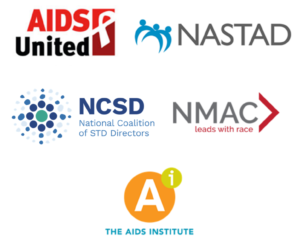By Robert Riester, 50+ Strong & Healthy Program Scholar
 This biennial conference is presented and funded by the Health Resources and Services Administration’s (HRSA) HIV/AIDS Bureau (HAB), and intended for comprehensive HIV care and treatment providers, Ryan White HIV/AIDS Program recipients and stakeholders, national partners, and people living with HIV. There were 4,000 attendees. (Note that PLWH are listed last).
This biennial conference is presented and funded by the Health Resources and Services Administration’s (HRSA) HIV/AIDS Bureau (HAB), and intended for comprehensive HIV care and treatment providers, Ryan White HIV/AIDS Program recipients and stakeholders, national partners, and people living with HIV. There were 4,000 attendees. (Note that PLWH are listed last).
Before the conference officially begins, HRSA holds business meetings for the Ryan White (RW) programs. As an active Planning Council member, I was invited to attend DMHAP business meeting for RW Part A. The meeting included updates on Policy Clarification Notices (PCNs), notably: 16:02, 18:01 and 15:02 (search hhs.gov website). They urge RW recipients and sub-recipients to collaborate. Among the examples of collaboration mentioned were NMAC’s Building Leaders of Color program including: National Trans Women of Color trainings and National Youth trainings, and CHATT for Planning Councils and Planning Bodies. The biggest news of the meeting was that the RW programs have full appropriation and that FY 2019 grant awards should be made in full before the end of the year.
The standing room only DCHAP “Let’s Talk About HIV & Aging” meeting included an AIDS Education Training Center overview, a RW recipient presentation, a Round Table discussion and Integrated Geriatric Care Models. Education and training of all care providers would be the major takeaway from this meeting. The HIV & Aging norms that have been extensively reported in recent years, due in large part to the efforts of NMAC’s 50+ Strong and Healthy program and Long-term Survivor (LTS) advocacy efforts, were presented with updated data and observations. The Round Table discussion now focused on long-term care, facilities, training of their staff and how LTS on fixed incomes would afford these services. HRSA officials suggested this would be a good talking point when the RW Program comes up for re-authorization (time TBD). Perpetual poverty, psychological age, poly-providers equals polypharmacy, rural/transportation, and dental concerns were also big issues discussed. Due to the overwhelming interest in this meeting, it was offered again as a session the same afternoon.
The Opening Plenary session rapid Takeaways: The release of the 2017 updated RW Data Report; 45+ age demographic is rising; 90.6 percent viral suppression rate for the 50+ age demographic; HRSA recognition of U=U; PrEP recommendation letter for Grade A; Rapid ART Program Initiative; Long acting ARTs and Antibody-Mediated Prevention being researched; Data needs to be leveraged; Strengthen 340-B; Opioid epidemic connection; Update the National AIDS Strategy to 2020; Carl Schmidt and John Wiesman to head Advisory Council to meet in March 2019; and Targeted geographic funding for Washington DC, Birmingham AL, and Atlanta, GA for demographic young African American males, Latinos and MSM who are at highest risk for HIV.
The PLWH Listening session with Dr. Laura Cheever was at capacity and was not limited to PLWH. There were many questions, with few answers other than suggesting re-authorization talking points. There were a couple of sessions on employing PLWH as peer advocates, but still left me with a “them” feeling.
Overall much was learned and attending with my fellow Planning Council members and Grantee staff was an invaluable bonding experience. Collaboration, provider education/training, data sharing and re-authorization talking points were the overarching takeaways for this advocate. Thank you NMAC 50+ Strong & Healthy program, especially Moises, Sable and Joanna for your support!

